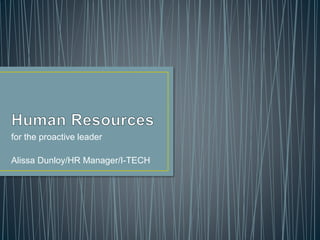
Managing difficult HR situations for organizational success
- 1. for the proactive leader Alissa Dunloy/HR Manager/I-TECH
- 2. From this weeks’ discussion board Describe a human resources management situation that you are proud of managing well – or describe one that didn’t go well. Take five minutes to think about: • In what ways did you try to help the situation? • What frustrated you? • Why did you feel it was necessary to intervene? • What would you do differently next time?
- 3. 1. As the Deputy Director, a few Directors that report to you struggle to work together, which is critical for the success of the organization. 2. As a trusted member of the organization, you often hear of employees who complain about the decisions of the leadership. People come to ask for advice or simply to vent. 3. A peer does not follow through with promises, and while paid the same as you, you feel they do very little in comparison. 4. A supervisee struggles with relationships, but does very well at the job itself. 5. You do not feel the “higher ups” in the organization understand what really happens on “the ground”, and you question some of their decisions.
- 4. What do you think you would learn from the most? A. A mentor who gives advice after listening to your problem. B. A critically thinking peer that asks you poignant questions that enables you to see your problem more fully and decide for yourself how you want to proceed. C. Having someone with more experience than you fix a problem for you so you can see how they would do it.
- 9. • Are you accountable for the outcome? • Is it too risky? • Trust • What is the worst that could happen?
- 10. • Get into groups of three or four • Review the scenario • Discuss the following: • If you found yourself in a similar situation, what would be your normal response? (Be honest with yourself!) • Identify behaviors that would lead to the Dreaded Drama Triangle. What are ways to avoid them? • Is the Empowerment Dynamic a good model to address this scenario? • If yes, how would you use it to approach the situation? • If no, what other types of models or approaches could you use?
Editor's Notes
- My introduction. Even if not an HR professional, Leaders are often responding to HR issues before the HR department may be involved or aware. Sometime when HR does get involved, the choices already made have made the situation worse or just more complicated than it needs to be. Leaders have an opportunity to increase the ability of those they are leading to solve some of their own problems, creating a learning opportunity rather than the leader simply making a decision or fixing a problem. Today’s session will be about shifting leadership focus from the typical problem solving mode, to more of a proactive learning and growth focus.
- While students are coming in. After the intro, come back to this and ask if there is anything people wanted to discuss more in class, or any ah-ha’s they had when I asked these questions.
- As a leader or HR professional we are called on often to respond to conflicts, ethical dilemmas (perceived or valid), and performance concerns. Listed here are a couple scenarios that we will take a deeper look at in class. First, I want you as a group to pick the two that you feel would be the best to dive into deeper.
- Vote
- Stephen Karpman – psychological and social model of human interaction, developed in 1968. You don’t need three different people for this to show up. The situation plays out when a situation arises and a person takes a role as victim or persecutor. Others then take the other roles.[7] Thereafter "the two players move around the triangle, thus switching roles",[7] so that for example the victim turns on the rescuer, the rescuer switches to persecuting—or as often happens the rescuer ends up entering the situation and becoming a victim. Think Damsel in Distress, Hero, and the Villain. Where do we see this occur? Victim is further victimized, even by the rescuer. Why? They never are empowered to solve their own problems. Take a minute to think of times where you have been in each of these roles. How did it feel? What role do you often find yourself in?
- David Emerald’s book, The Power of TED. The persecutor of victim becomes the challenger who offers productive criticism and motivates someone to become better. Could be healthy competition with a competitor as in sports, could be a long lasting friend that knows you well and doesn’t let you get away with anything (roommate from undergrad). Difference is forward focus rather than blaming or trying to control the other. Coach or mentor helps you see new things, learn, supportive and cultivates empowerment. Victim becomes creator who sees that they are in control of their own reactions to situations, acts from a place of knowing the vision from what they want in their life. Problems are challenges to be learned from.
- Which one do you think this approach falls under?
- The Empowerment Dynamic focuses on the Vision or Outcome with steps towards that vision using the passions of those involved to get there. Notice this focus does not have room for blame. I see it as a more proactive, collaborative approach. What would be required to move from the Problem focused, Drama Triangle, to the Vision focused Empowerment dynamic?
- Is it realistic all the time?
